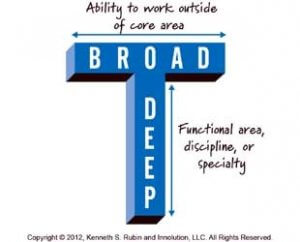From a Dysfunctional to Cross-Functional Agile Team-EN
Jacqueline Sanders-Blackman
- Business Agility
- Article
Tabla de contenidos
Are you on a high performing, cross-functional agile team? Not sure? Think about this…What would happen if your next annual evaluation wasn’t done by your manager (based on your individual contribution), but instead by your agile team? One half of your review would be peer-based, and the other half would be comprised of your team’s performance metrics. Would you be surprised, worried, angry, or thrilled?
Anyone who has been a part of an agile team or even knows about the agile methodology knows that well-formed, cross-functional agile teams are the key to the collaborative agile approach. The ScrumAlliance website says, “A well-formed team is the key to providing rapidly adapting developmental services through Agile pathways (eg Scrum, Lean, SAFe, Kanban and XP).”
 T-shaped Skill Set
T-shaped Skill Set
Agile teams size is relatively small (5-9 people), so it stands to reason that a truly cross-functional agile team increasingly needs individuals with a “T-shaped” skill sets. According to Wikipedia, “The vertical bar on the T represents the depth of related skills and expertise in a single field, whereas the horizontal bar is the ability to collaborate across disciplines with experts in other areas and to apply knowledge in areas of expertise other than one’s own.”
Remember the old saying, “Jack of all trades and master of none?” Think of this as, “Jack of all trades but master of one (or two).”
If individuals only have breadth and good collaboration skills, they don’t possess the tangible experience needed to actually contribute or accomplish tasks. The complexity in the problems being solved at the speed in which agile teams need to respond, requires even higher levels of expertise or depth. Conversely, individuals that possess strong experience, but lack collaboration or cross-functional agile team skills, tend to spend their time in teams expressing their point of view versus building on others views. The idea of having a development team with T-shaped skills is essential to agile team structure and its success because it not only means that individuals have a better understanding of their team members’ areas of expertise and what is necessary for each role to be successful, but that each member can easily pick up tasks and assist their team members when needed.
It’s imperative that team members continue to strengthen their area of specialization, as well as broaden their general knowledge of complementary skills. This combination of depth in one or two areas and breadth in several provides the necessary context and foundation that professionals on agile teams, or any team, must possess in the future. The most successful teams possess comprehensive interdisciplinary skills that compliment each other to provide the most value.
Agile teams must be acutely aware that a single point of failure can easily arise if team members are not crossed trained. If there is only one person to do the testing, analysis, or the coding, a task, a story and even the sprint could be jeopardized if that person is out sick, vacation or leaves the team.
Do your team members have the combined T-shaped skills needed for an effective cross-functional agile team? See my Inventory Your Agile Analysis Toolbox article to get started.
On the flip side, agile teams don’t need go to the other extreme which expects everyone to be a master of every discipline. This might result in taking people way out of their comfort zone and even capacity. Not everyone on the team should be able to write and change code. Respectfully, not everyone should be expected to be a great facilitator or liaison. Everyone’s “T” should be customized in order to make that team member successful. A good balance is to ensure:
- Everyone expands in at least two areas beyond their specialty or core competency
- Reward those that stretch beyond their comfort zone
Developing T-shaped skills requires cross training in order to introduce the group to different perspectives, different ways of thinking and therefore different ways of looking at and solving a problem. Exposing Developers, Testers, Business Analysts, etc to each other’s disciplines, will reveal that some roles look at things from a systematic perspective, while another may look at it from a critical thinking approach and yet another from a design and logical thinking approach. Combined thinking approaches will result in a well-rounded solution.
Cross Training
Cross training allows each agile team member to appreciate the other team member’s thought process and over time pick up on the different mindsets. Each member can be a better support system to the people accountable for the specialized work and appreciate their challenges.
The exercises we’ve created in our Agile Analysis Boot Camp include cross-functional role-playing. Through these simulations, students learn how cross-functional training can be applied to:
- assist team members to help balance the workload,
- appreciate and respect the contributions of the other team members, and
- help with collaboration and decision-making choices that incorporate the various perspectives.
Organizations that don’t foster healthy and cross-functional agile teams will see less value and risk sprint fatigue, which can lead to team members dropping out. Losing a trained, experience resource is expensive in general, but it also costs the agile team their velocity, cohesiveness and motivation. Fortunately, through proper cross training, this can be avoided.
Do your team members have the combined T-shaped skills needed for an effective cross-functional agile team? Contact us for a consultation with our experienced agile team coach.
Making the health of your team a priority will increase motivation and keep quality, high value output at a consistent and sustainable plateau. Don’t be afraid of a team based evaluation; in fact encourage it! Even though it may take a concerted effort to change the climate and culture or your organization to focus on team contributions…think about it, the impact could be exponential.
All the best,
Jacqueline